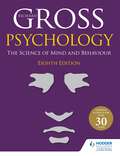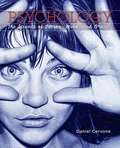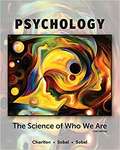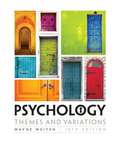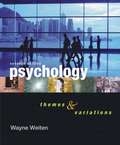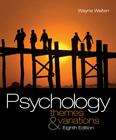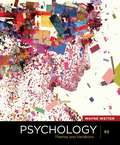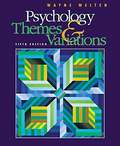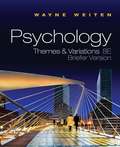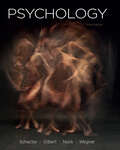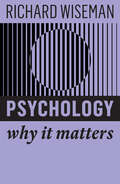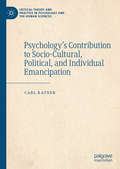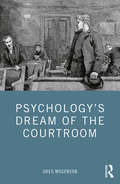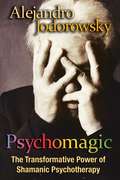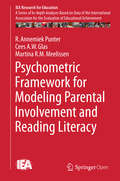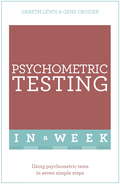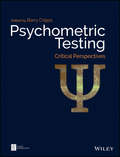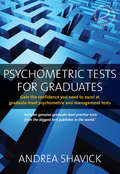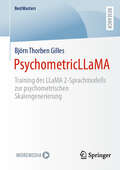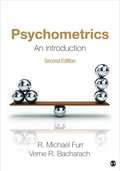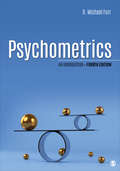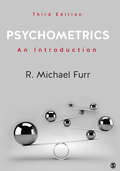- Table View
- List View
Psychology: The Science of Mind and Behaviour 8th Edition
by Richard GrossBuild a solid foundation for students to develop the skills and knowledge they need to progress with the updated edition of Richard Gross's best-selling introduction to Psychology.This 8th edition of Psychology: The Science of Mind and Behaviour is the essential guide to studying Psychology, helping over half a million students during its 30 years of publication.- Easily access psychological theories and research with user-friendly content and useful features including summaries, critical discussion and research updates.- Develop evaluative skills, with new evaluation boxes, encouraging students to put classic and contemporary studies into context.- Consolidate understanding by identifying common misconceptions.- Stay up to date with revised content and the latest psychological research.- Understand the research process with updated contributions from leading Psychologists including Elizabeth Loftus, Alex Haslam and David Canter.
Psychology: The Science of Person, Mind, and Brain
by Daniel Cervone Tracy L. CaldwellIn Psychology: The Science of Person, Mind, and Brain, experienced teacher, researcher, and author Daniel Cervone provides students with a new and exciting way of understanding psychology. Cervone organizes material around three levels of analysis -- person, mind, and brain -- and employs a person-first format that consistently introduces topics at the person level: theory and research on the lives of people in sociocultural contexts. Students are able to make sense of the latest research through what they understand best: people.
Psychology: The Science of Who We Are
by Fountainhead PressPsychology: The Science of Who We Are presents an overview of the major ideas and themes of modern psychology studied in introductory and general psychology courses. With an emphasis on real-life applications of psychological theories and concepts, Shawn Charlton, Susan Sobel, and Ken Sobel offer not only the structure and history of psychology but also explain such concepts through relatable examples and common experiences. As students study this text, they will learn about the tools of modern psychology, the role of biological systems in shaping behavior, how the brain makes sense of the world, how they change and mature throughout their lifespans, how behavior affects their understanding of their environments, what creates personality, the differences between thinking and intelligence, what defines normal and abnormal behaviors, how to treat abnormal behaviors, and the dynamics of social environments. Students studying this text will build a foundation for further studies in psychology and for better understanding themselves and others.
Psychology: Themes and Variations
by Wayne WeitenA more concise version of the introductory psychology text offering thorough coverage of the major theories (and controversies) in the field today. The focus is on ideas rather than facts, integrating research and application in the areas of biological behavior concepts, sensation and perception, consciousness, conditioning, memory, language and thought, intelligence and psychological testing, emotion, human development, personality theory, stress, psychological disorders, psychotherapy, and social behavior. Includes very jazzy color photographs and illustrations. Paper edition (unseen), $48.75. Annotation c. by Book News, Inc., Portland, Or.
Psychology: Themes and Variations
by Wayne WeitenA more concise version of the introductory psychology text offering thorough coverage of the major theories (and controversies) in the field today. The focus is on ideas rather than facts, integrating research and application in the areas of biological behavior concepts, sensation and perception, consciousness, conditioning, memory, language and thought, intelligence and psychological testing, emotion, human development, personality theory, stress, psychological disorders, psychotherapy, and social behavior. Includes very jazzy color photographs and illustrations. Paper edition (unseen), $48. 75. Annotation c. by Book News, Inc. , Portland, Or.
Psychology: Themes and Variations
by Wayne WeitenBiological bases of behaviour - Sensation and perception - Sleep and dreams - Learning through conditioning - Human memory - Language and thought - Intelligence and testing - Motivation and emotion - Human development across the life span - Personality - Coping and stress management - Suicide - Psychological disorders - Psychotheraphy - Social behaviour - Split brain research (Gazzaniga, Bogen & Roger Sperry)
Psychology: Themes and Variations (5th Edition)
by Wayne WeitenFilled with exciting, current research findings, this affordable CENGAGE ADVANTAGE BOOKS version of PSYCHOLOGY: THEMES AND VARIATIONS shows you the many ways that psychology applies to your life today and every day! In the book's "Featured Studies," you'll get a bird's eye view of real psychological research in action. "Critical Thinking Applications" give you specific critical thinking tools that you can use to help you think analytically and critically about what you read. Weiten also helps you excel in the psychology course by including overarching concepts--weaving these concepts throughout the book to help you see how the topics and research you are studying fit together into one understandable picture called psychology! Every chapter offers tools to help you focus on what's important--showing you how to study in ways that help you retain information and do your very best on exams.
Psychology: Themes and Variations (8th Edition)
by Wayne WeitenIn PSYCHOLOGY: THEMES AND VARIATIONS, BRIEFER VERSION, Wayne Weiten continues his proven combination of a scientifically rigorous text with selective pedagogy that makes learning easy for students. Weiten's approach is backed by a straightforward writing style, unparalleled in-text visuals and didactic art program, and in-book review to help users prioritize and retain the core concepts. Weiten surveys psychology's broad range of content with three aims: to illuminate the process of research and its intrinsic relationship to application (themes); to show both the unity and diversity of the subject (variations), and to invite users to the study of psychology by respecting their ability to master its fundamental concepts. Weiten's themes (including empiricism, theoretical diversity, sociohistorical contexts, multifactorial causation, cultural heritage, heredity and environment, and subjectivity of experience) and variations provide unifying threads across chapters that help users see the connections among different research areas in psychology.
Psychology: Themes and Variations (Seventh Edition)
by Wayne WeitenThe Seventh Edition of Wayne Weiten's popular text, Psychology: Themes and Variations, continues to offer students a unique survey of psychology with three distinct goals: to show both the unity and diversity of psychology's subject matter; to illuminate the process of research and its intimate link to application, and to make the text challenging to think about and easy to learn from.
Psychology: Theory And Application
by Schacter Gilbert Nock WegnerThis bestselling textbook brings the latest developments in psychology to students in a signature writing style that will inspire a lifelong love of science. The authors--respected researchers and writers of popular press titles--invite students to join them on a tour of their favorite subject--psychological science. The new edition takes a closer look at the role psychology plays in our society, with new material in Chapter 2 that looks at the truth about psychological science, the rate of replication in published studies, and how critical thinking is foundational in science and life. Chapter 1 presents a new look at the history of the science with unexpected stories and new insights into its surprising origins. Each chapter has been fully updated with research and examples to portray a field that is constantly evolving and illuminating the world today. Combined with LaunchPad, including the LearningCurve adaptive quizzing system, the new Fifth Edition is a powerful way to introduce students to the science of psychology.
Psychology: Why It Matters (Why It Matters)
by Richard WisemanYou are remarkable: You experience a vast range of thoughts and feelings, including falling in love, remembering last Tuesday, and contemplating the meaning of life. And you can carry all sorts of astonishing behaviours, such as sauntering down the street, singing in falsetto and riding a unicycle. Psychologists study every aspect of how you think, feel, and behave. Richard Wiseman takes you on a personal journey into this fascinating world, focusing on what makes for meaningful research. He explores how psychology reveals the hidden workings of the mind, boosts critical thinking, debunks myths, improves lives, and informs debates in politics, philosophy, and education. This insider&’s guide lifts the lid on how psychologists go about their work, examines contemporary challenges associated with studying the mind, and encourages students and researchers to reflect on why they do what they do.If you&’ve ever wanted to think like a psychologist, spot a liar, uncover the truth about happiness, or discover how to create a more altruistic society, then this book is for you.
Psychology’s Contribution to Socio-Cultural, Political, and Individual Emancipation (Critical Theory and Practice in Psychology and the Human Sciences)
by Carl RatnerThis book articulates how psychologists can use their theory, research, and intervention to generate insights into emancipatory social change that is necessary to solve social and psychological problems. These include racism, sexism, civil rights, poverty, militarism, education, and politics. Psychology was not developed to directly address social issues. It must therefore be reconceptualised to fulfil this aim. In this book Carl Ratner makes use of Vygotsky’s psychological approach known as ‘cultural-historical psychology’, supplemented by Martin-Baro’s Liberation Psychology and the work of Bourdieu and Foucault to develop an emancipatory psychological theory. This approach is then utilized to lay out a specific program of social and psychological emancipation. This reconstructed psychological theory is also used to evaluate populist movements that aim at social and psychological emancipation. Ratner posits that populism is inadequate to solve social and psychological problems because it misunderstands the nature of society and what it takes to improve society and psychology. This is demonstrated through wide-ranging examples including populist feminism, populist socialism, and populist distortions of liberation psychology and cultural-historical psychology.This lively critique opens a pathway for academic across the social sciences concerned with how their disciplines can be oriented toward understanding and solving social-psychological problems, and will appeal to wide readership including policy makers, and social activists.
Psychology’s Dream of the Courtroom
by Greg MogensonWhat contribution has “the law” made to the work of analyst and patient in the consulting room? And what insights may be drawn from putting psychology itself on trial? In this ground-breaking book, the use of legal metaphors and the courtroom analogy by Freud, Jung, and psychology more generally are examined in relation to the practice of psychotherapy and analysis. In this way, psychoanalysis and analytical psychology are shown in fresh perspective to be disciplines of truth in the spirit of a trial or court proceeding.
Psychomagic: The Transformative Power of Shamanic Psychotherapy
by Alejandro JodorowskyA healing path using the power of dreams, theater, poetry, and shamanism • Shows how psychological realizations can cause true transformation when manifested by concrete poetic acts • Includes many examples of the surreal but successful actions Jodorowsky has prescribed to those seeking his help While living in Mexico, Alejandro Jodorowsky became familiar with the colorful and effective cures provided by folk healers. He realized that it is easier for the unconscious to understand the language of dreams than that of rationality. Illness can even be seen as a physical dream that reveals unresolved emotional and psychological problems. Psychomagic presents the shamanic and genealogical principles Jodorowsky discovered to create a healing therapy that could use the powers of dreams, art, and theater to empower individuals to heal wounds that in some cases had traveled through generations. The concrete and often surreal poetic actions Jodorowsky employs are part of an elaborate strategy intended to break apart the dysfunctional persona with whom the patient identifies in order to connect with a deeper self. That is when true transformation can manifest. For a young man who complained that he lived only in his head and was unable to grab hold of reality and advance toward the financial autonomy he desired, Jodorowsky gave the prescription to paste two gold coins to the soles of his shoes so that all day he would be walking on gold. A judge whose vanity was ruling his every move was given the task of dressing like a tramp and begging outside one of the fashionable restaurants he loved to frequent while pulling glass doll eyes out of his pockets. The lesson for him was that if a tramp can fill his pockets with eyeballs, then they must be of no value, and thus the eyes of others should have no bearing on who you are and what you do. Taking his patients directly at their words, Jodorowsky takes the same elements associated with a negative emotional charge and recasts them in an action that will make them positive and enable them to pay the psychological debts hindering their lives.
Psychometric Framework for Modeling Parental Involvement and Reading Literacy
by Annemiek Punter Cees A. W. Glas Martina R. M. MeelissenThis volume offers insights from modelling measures of parental involvement and their relationship with student reading literacy across countries, exploring and incorporating cultural differences. This is a significant contribution to a field where cross-cultural comparisons from a triangulated perspective are sparse. For readers interested in exploring the relationship between parental involvement and student attainment, the literature review provides a useful starting point. Meanwhile, for the more methodologically interested reader, this report presents state-of-the-art ways to identify and model cultural differential item functioning in international large-scale assessment (ILSA), illustrating the extent to which the parental involvement construct may be influenced by cultural differences and how this may affect the outcomes of cross-cultural comparisons. The framework is generic and should provide a solid foundation for future ILSA practices and secondary analyses. ILSA studies like the IEA's Progress in International Reading Literacy Study (PIRLS) provide valuable data, containing both student achievement data and contextual background data from schools, teachers, students and parents for over 41 countries.
Psychometric Testing In A Week: Using Psychometric Tests In Seven Simple Steps (Teach Yourself In A Week Ser.)
by Gareth Lewis Dr Gene CrozierPsychometric testing just got easierWe can measure how tall someone is, how strong they are or how fast they can run. But is it also possible to evaluate an individual's character traits, how they think and how they mightreact in a given situation? With psychometric tests, we can.Most people feel some trepidation at just the thought of taking a psychometric test. These tests can also be a source of anxiety for those who have never administered them before. If you are a project manager or an HR professional tasked with introducing psychometric tests to your organization and have no previous experience of using them, then reading this book is the first step you should take. Our aim is to overcome any fear of using tests by demystifying a subject that can, for the uninitiated, seem quite complex and daunting. This not a technical manual and so we have avoided unnecessary jargon and academic language. You certainly won't need a degree in mathematics or psychology to comprehend any of the contents. We will provide simple descriptions of psychometric tests, the benefits they offer, and the practical measures you will need to take to use them effectively. In just seven days, you will gain a basic understanding of psychometric tests that will serve as a sound foundation for whatever further learning you decide to pursue.Each of the seven chapters in Psychometric Testing In A Week covers a different aspect:- Sunday: The importance of psychometric testing- Monday: What are psychometric tests?- Tuesday: Tests of ability and aptitude- Wednesday: What is personality?- Thursday: Selecting psychometric tests- Friday: The uses of psychometric tests- Saturday: The organizational perspective
Psychometric Testing In A Week: Using Psychometric Tests In Seven Simple Steps (Teach Yourself In A Week Ser.)
by Gareth Lewis Gene CrozierThe ability to understand and perform well in psychometric tests is crucial to anyone who wants to advance their career.Written by Gareth Lewis and Gene Crozier, leading experts on psychometric testing, this book quickly teaches you the insider secrets you need to know to in order to make psychometric tests work for you.The highly motivational 'in a week' structure of the book provides seven straightforward chapters explaining the key points, and at the end there are optional questions to ensure you have taken it all in. There are also cartoons and diagrams throughout, to help make this book a more enjoyable and effective learning experience.So what are you waiting for? Let this book put you on the fast track to success!
Psychometric Testing: Critical Perspectives (BPS Textbooks in Psychology)
by Barry CrippsPsychometric Testing offers an in-depth examination of the strengths and limitations psychometric testing, with coverage of diverse methods of test development and application. A state-of-the-art exploration of the contemporary field of psychometric testing, bringing together the latest theory and evidence-based practice from 21 global experts Explores a variety of topics related to the field, including test construction, use and applications in human resources and training, assessment and verification of training courses, and consulting Includes applications for clinical psychology, performance psychology, and sport and exercise psychology across a range of professions (research, teaching, coaching, consulting, and advising) Acknowledges the dynamic nature of the field and identifies future directions in need of more research, including Internet and smart phone testing
Psychometric Tests for Graduates: Gain the confidence you need to excel at graduate-level psychometric and management tests
by Andrea ShavickAre you a graduate? Looking for a brilliant job? Then you should know that over 95 percent of the FTSE 100 companies use psychometric and management tests to select their graduate recruits, as do the police, the Civil Service, local authorities, the Armed Forces, the Fire Service, financial institutions, the motor industry, the IT industry - the list is endless. In fact, tests are now an integral part of the recruitment process for most medium-large sized organisations worldwide. So if you're looking for a job, you need this book! It includes: 37 genuine graduate-level practice tests from SHL Group plc, the biggest test publisher in the world; 227 questions covering verbal, numerical, abstract and spatial reasoning, mechanical comprehension, fault diagnosis, accuracy and personality; and, genuine practice Brainstorm, Scenarios and Fastrack management tests. It also includes valuable advice on: online psychometric tests; researching your target employer; and, assessment centre visits (including role-plays, group discussions, in-tray exercises and presentations). This book gives you the three things you need to pass graduate-level psychometric and management tests: information, confidence, and plenty of practice.
PsychometricLLaMA: Training des LLaMA 2-Sprachmodells zur psychometrischen Skalengenerierung (BestMasters)
by Björn Thorben GillesDie rasante Entwicklung generativer Sprachmodelle eröffnet neue Möglichkeiten der psychologischen Skalenentwicklung. Diese prä-registrierte Arbeit untersucht den Einsatz von Sprachmodellen zur automatischen Generierung von Likert-Items, aufbauend auf bisherigen Ansätzen. Ein neuer Datensatz wurde durch eine systematische Literaturrecherche erstellt und mit bestehenden Quellen kombiniert, um das LLaMA 2-Sprachmodell mittels Low-Rank Adaption zu trainieren. Das Modell generiert auf Basis einer Definition psychologische Items mit Anpassungsmöglichkeiten für Schwierigkeit und Kreativität. Zur Überprüfung der psychometrischen Güte wurden Items zu sechs Konstrukten generiert und online mit N = 200 Personen erhoben. Die Ergebnisse zeigten vielversprechende psychometrische Kennwerte: Die meisten Items konnten eine gute interne Konsistenz und hohe Korrelationen mit den Originalskalen aufweisen. Allerdings war die Anpassung der Item-Schwierigkeit nicht erfolgreich. Unterschiede in Antwortverteilung und Interkorrelationen zwischen KI- und Originalskalen wurden festgestellt. Insgesamt leistet diese Arbeit einen bedeutenden Beitrag zur psychologischen Fragebogenkonstruktion durch das Fine-Tuning eines KI-Modells zur Generierung reliabler und valider Items.
Psychometrics: An Introduction
by R. Michael Furr Dr Verne R. BacharachFrom a perspective that focuses on the meaning, purpose, and implications of key psychometric concepts, principles, and procedures, Psychometrics: An Introduction, Second Edition (by R. Michael Furr and Verne R. Bacharach) introduces the subject and study of psychometrics. It addresses these topics at a level that is deeper and more focused than what is found in typical introductory undergraduate testing and measurement texts, but is much more intuitive than what is traditionally found in the more technical publications intended for advanced graduate courses. By emphasizing concepts over mathematical proofs and by focusing on practical significance, this book assists students in appreciating not just how measurement problems can be addressed, but why it is crucial to address them.
Psychometrics: An Introduction
by Richard Michael FurrIn this fully revised Fourth Edition of Psychometrics: An Introduction, author R. Michael Furr centers his presentation around a conceptual understanding of psychometric core issues, such as scales, reliability, and validity. Focusing on purpose rather than procedure and the "why" rather than the "how to," this accessible book uses a wide variety of examples from behavioral science research so readers can see the importance of psychometric fundamentals in research. By emphasizing concepts, logic, and practical applications over mathematical proofs, this book gives students an appreciation of how measurement problems can be addressed and why it is important to address them. The book offers readers the most contemporary views of topics in psychometrics available in the nontechnical psychometric literature.
Psychometrics: An Introduction
by Richard Michael FurrIn this fully revised Fourth Edition of Psychometrics: An Introduction, author R. Michael Furr centers his presentation around a conceptual understanding of psychometric core issues, such as scales, reliability, and validity. Focusing on purpose rather than procedure and the "why" rather than the "how to," this accessible book uses a wide variety of examples from behavioral science research so readers can see the importance of psychometric fundamentals in research. By emphasizing concepts, logic, and practical applications over mathematical proofs, this book gives students an appreciation of how measurement problems can be addressed and why it is important to address them. The book offers readers the most contemporary views of topics in psychometrics available in the nontechnical psychometric literature.
Psychometrics: An Introduction (Sage Library In Social And Personality Psychology Methods Ser.)
by R. Michael FurrUsing a meaning-based approach that emphasizes the “why” over the “how to,” Psychometrics: An Introduction provides thorough coverage of fundamental issues in psychological measurement. Author R. Michael Furr discusses traditional psychometric perspectives and issues including reliability, validity, dimensionality, test bias, and response bias as well as advanced procedures and perspectives including item response theory and generalizability theory. The substantially updated Third Edition includes broader and more in-depth coverage with new references, a glossary summarizing over 200 key terms, and expanded suggested readings consisting of highly relevant papers to enhance the book’s overall accessibility, scope, and usability.
